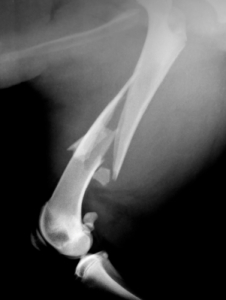9 Ways to Sabotage Your Pet’s Surgery
Everything your veterinarian has done in his or her career has led up to this point. Your pet is about to undergo surgery, and your veterinarian will draw on years of practice, thousands of hours of study, and a lifetime of learning to ensure that everything goes smoothly. The surgical team is assembled and properly trained. Sterile instruments are glistening under the bright operating room lights. The beeps and blips of the monitors affirm that all is well. But there is one key member of the team that is not in attendance, and the success of the surgery cannot be assured without his or her help. That person is you, the pet owner. Your veterinary surgeon needs your help before and after surgery to make sure that everything that happens in the OR has the best chance of success. To do your part in getting your pet back in the pink, avoid the following 9 mistakes.

1. Don’t Follow Pre-Operative Instructions
Unless your pet is undergoing emergency surgery, your vet will give you instructions to follow in the days leading up to the operation. These may include giving or withholding medication, fasting your pet, or even giving your pet a bath. It is very important to follow all of these instructions. For example, some medications can interfere with blood clotting, and if they are not discontinued before surgery, excessive bleeding can occur. Some animals get nauseous under anesthesia. A full stomach increases the risk that your pet may accidentally inhale food into the lungs should vomiting occur during the procedure. Superficial skin infections can be dragged into deeper tissues by a scalpel blade. An antimicrobial bath decreases the number of bacteria on the skin surface. There is a reason behind every item on the list of instructions you will be given. If you aren’t sure why you are being asked to do something, just ask.
2. Don’t Ask Questions
If your pet needs surgery, your veterinarian will explain why the surgery is necessary, what to expect before and after surgery, potential complications, prognosis, alternative treatments, and cost. You are going to get a lot of information thrown at you. If there is something that is unclear, please ask questions. We want you to feel comfortable with your decision. You are a vital part of the team and must be certain that surgery is the best option for your beloved pet.
3. Get Your Information From The Internet
The internet is a wealth of information. Unfortunately, some of it is bad, and it can be very difficult to know the difference. Some people misstate facts. Other people substitute opinion for absolute truth. Yet others will share stories about their own pets, which may have little applicability to your pet’s situation. There is nothing wrong with using the internet to educate yourself about your pet’s condition or treatment options, but please use this acquired knowledge as the basis for a conversation with your vet, not as a substitute for it.
4. Don’t Give Informed Consent
Informed consent is the process of giving formal permission to your veterinarian to perform the scheduled surgery. It can only be given when you have a clear understanding of the facts regarding your pet’s condition and the proposed treatment. When you are ready to give informed consent, it means that you have had all your questions answered satisfactorily and you are prepared to proceed with surgery.

5. Procrastinate
In many cases a delay in performing a surgery won’t have any adverse effect on the outcome. Unfortunately, that is not always the case. Suspicious lumps can grow larger. Continued vomiting can lead to further dehydration and debilitation. An ongoing lameness can result in significant muscle atrophy. If you must delay a surgery, ask your veterinarian if the delay has the potential to make it less likely for your pet to make a complete recovery.
6. Don’t Show Up On Time
The day will start with a realistic schedule for all the surgeries and appointments to be seen, but an unexpected C-section or bloat can always throw a wrench in the works. Please don’t contribute to the problem. Your vet will tell you what time to drop off your pet for surgery, ensuring that there is ample time to do a meticulous and thorough job. You don’t want your surgeon to feel rushed because you were late, he is falling behind schedule, and the waiting room is starting to fill with the afternoon appointments.
7. Don’t Follow Post-op Instructions
After surgery your pet will need time to heal, and creating the ideal home environment for a successful recovery will be your responsibility. Bandage care, exercise restrictions, special diets, medication, physical therapy, not letting the kids torment the dog…these are all examples of some of the things you will be asked to do once your pet returns home. It is important to follow all of the post-op instructions. The more you deviate from the optimal post-op care, the greater the chance for complications.
8. Missing Recheck Appointments
Your pet may be asked to return to the hospital a number of times after surgery. It may be necessary to change bandages, remove sutures or drains, or obtain x-rays. Many times rechecks are necessary for the early detection of potential problems. If you skip those rechecks, minor issues can turn into major complications.
9. Failure to Fulfill Your Financial Obligation
All veterinarians love animals, but it costs money to operate a veterinary hospital. The surgery that your vet just performed on your pet involved a significant financial investment. There was the cost of surgical supplies such as sutures, gloves, and drapes. The surgical team gets paid for their expertise. The OR is filled with anesthesia machines, heart monitors, and resuscitation equipment that all had to be purchased. The surgeon attends conferences to stay current on the safest and most effective techniques. The list goes on and on. The goal of these investments is one thing only: a successful operation on your pet. Your vet will give you an estimate before surgery, but if you fail to meet your financial obligation, the cost of performing surgery on your pet will have to be absorbed by other pet owners, and there is nothing fair about that.
The best health care for your pet results when the entire team works together, and you are a vital part of that team. Veterinarians promise to use all their knowledge and skill to do their very best, but we need your help.

